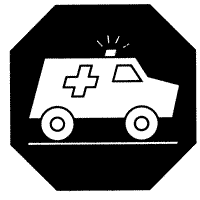Vol. 3, No. 1 • Fall 1998
Do You Know What to Do in
an Emergency?
by Joe Jordan
�Of course, everyone knows that you dial 9-1-1 in an emergency! In a short while, EMS will be there! Anyway, I�m not a medical person, I�m a parent. I don�t have time! After all, my relicensing doesn�t require that I complete any training in first aid, CPR, and other things. I just need to know about time out, contracts, special needs, etc.�Does this sound familiar? In all honesty, the results of this reasoning could be tragedy for YOU. My family nearly learned this the hard way . . .
It was a cold, rainy Thanksgiving Eve. We were anxiously preparing for the holiday. Many relatives were expected to come to our home and celebrate. That evening, we were faced with an incident that truly changed our lives.
While driving down a remote road, a sudden yell came from the back seat: �Oh my God, he�s choking!�
Our 15-year-old daughter panicked�our 19-month-old son was choking on a piece of hard candy.
My daughter, our son, and Tonya (my wife) were the only ones in the car. With the child gasping for breath, the teenager screaming and rain pouring heavily, Tonya managed to pull over safely. Nearly breaking the door, Tonya frantically pulled the child safety seat straps off our son. By this time, he appeared to have stopped breathing.
�Oh my God, I don�t know what to do!� thought Tonya.
She turned the child upside down and began to shake him forcefully. Miraculously, the boy began to cry and scream. �Mommy! Mommy!� Tonya and our daughter held the child tight with tears of joy.
A police officer pulled over and dialed for emergency help. They also dialed for me to come. Our son was taken to the hospital and was surprisingly fine.
Later, we learned that a lady had given our daughter the candy to give to our son at the church service they attended. Our daughter gave him the candy in the car.
That incident taught us many lessons. First of all, it is important that anyone who provides care for a child, teenager, or adult should know the proper procedures and techniques to perform in an emergency. Going through the appropriate training can decrease serious medical problems caused by improper techniques.
Secondly, issues pertaining to health and safety are essential. Everyone�children, youth, and adults�should be informed and taught appropriately. Learning and training about lifesaving techniques, health, and safety should be a lifelong process. This education should result in some change of attitude, knowledge, or skill. Although agencies may not it, training in these areas is critical.
We cannot assume people know what to do in an emergency. Those of who do know must be motivated and willing to offer wisdom, knowledge, and understanding to others. Please support these efforts in your foster parent associations, social and community agencies.
Joe Jordan is a foster parent in Durham County. He and his wife, Tonya, have been foster parents for over 5 years.
Copyright � 2000 Jordan Institute for Families

